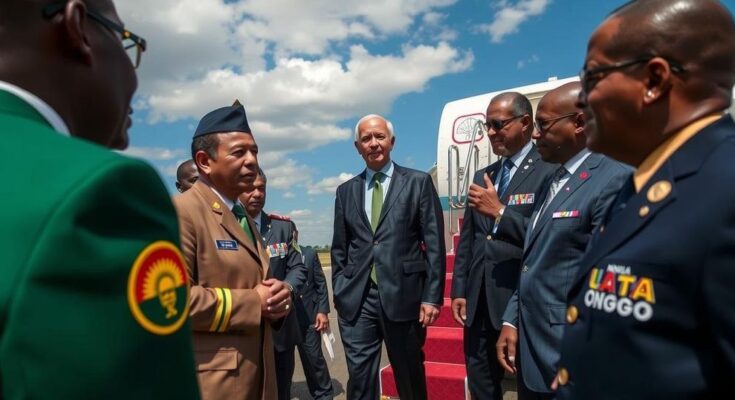President Joe Biden arrived in Angola for a three-day visit aimed at countering China’s influence through the Lobito Corridor railway project. He will engage with Angolan President João Lourenço and discuss U.S.-Africa relations, emphasizing the importance of critical minerals amid a changing administration. The visit seeks to solidify U.S. diplomatic ties, despite concerns surrounding human rights issues in Angola.
President Joe Biden commenced his much-anticipated journey to sub-Saharan Africa on a three-day visit, which includes Angola as a focal point. The trip aims to bolster U.S. influence in the region and counter China’s dominance, particularly through the Lobito Corridor railway project, which spans Zambia, Congo, and Angola. This redevelopment is designed to enhance U.S. ties to essential minerals utilized in electric vehicle batteries, clean energy, and electronics, amidst a geostrategic rivalry with China.
Biden’s journey follows a brief meeting with Cape Verde’s Prime Minister, and will involve significant discussions with Angolan President João Lourenço, a visit to the National Slavery Museum, and an exploration of the Lobito port city. Despite being his first visit to sub-Saharan Africa as president, concerns linger regarding the prioritization of the continent within U.S. foreign policy amidst the impending transition to Donald Trump’s administration.
National security spokesman John Kirby defended the timing of the visit, emphasizing its importance despite the nearing conclusion of Biden’s presidency. This railway initiative is pivotal not only for American interests but also aims to combat China’s expanding influence in Africa, a region where the U.S. has traditionally engaged through trade and humanitarian aid. The Lobito project represents $3 billion in U.S. investment, prompting optimism for its continuation despite the administration change slated for January 20.
As the Lobito Corridor strives to enhance U.S. infrastructure engagement in Africa, it is crucial for fostering connections that can potentially outmaneuver China’s present stronghold over vital mineral resources. While the Biden administration promotes the project, it is recognized that the sustainability of this initiative largely hinges on the forthcoming administration’s policies towards Africa.
Biden’s arrival in Angola marks a milestone in U.S.-Angola relations, showcasing significant diplomatic advancements since a historically adversarial period. The visit is also expected to address important issues, including health, agribusiness, and security cooperation, while acknowledging broader concerns regarding human rights and governance in Angola.
The article discusses President Joe Biden’s first official visit to sub-Saharan Africa, particularly focusing on Angola, where he aims to strengthen U.S. interests in the face of growing Chinese influence. The visit seeks to emphasize the Lobito Corridor railway project, which connects Zambia and Congo to Angola’s port, fostering connections essential for critical minerals. Furthermore, it examines the implications of Biden’s policies on U.S.-Africa relations, especially as his presidency is nearing its end and Donald Trump is preparing to assume office.
In conclusion, President Joe Biden’s visit to Angola embodies a significant strategic initiative aimed at countering China’s influence in sub-Saharan Africa through the Lobito Corridor railway project. This visit underscores the importance of U.S.-Africa relations and highlights the ongoing competition for critical minerals. Despite challenges posed by the transition to a new administration, the Lobito project represents a potential cornerstone of U.S. engagement in Africa that could endure beyond Biden’s tenure.
Original Source: www.mercurynews.com




